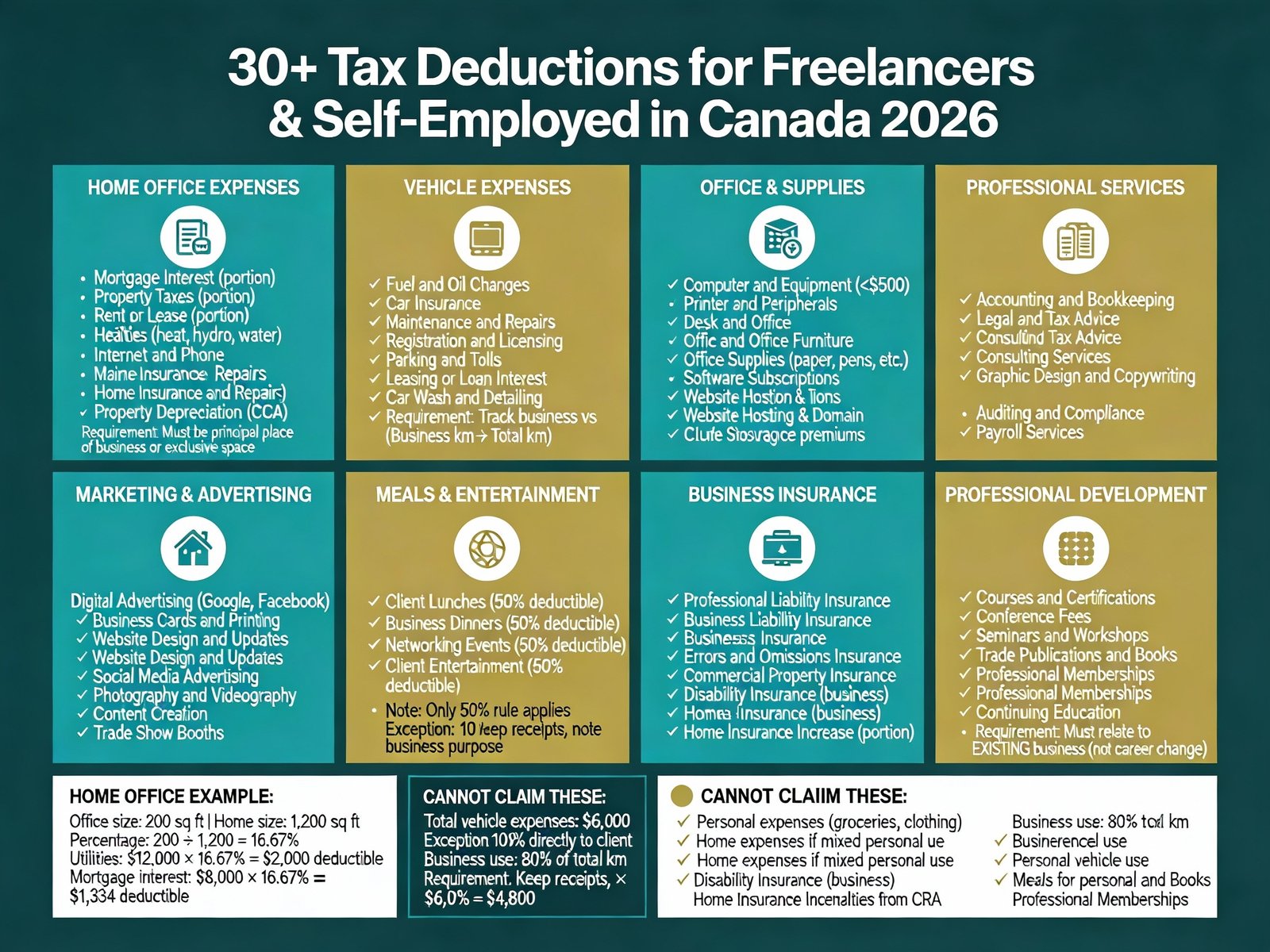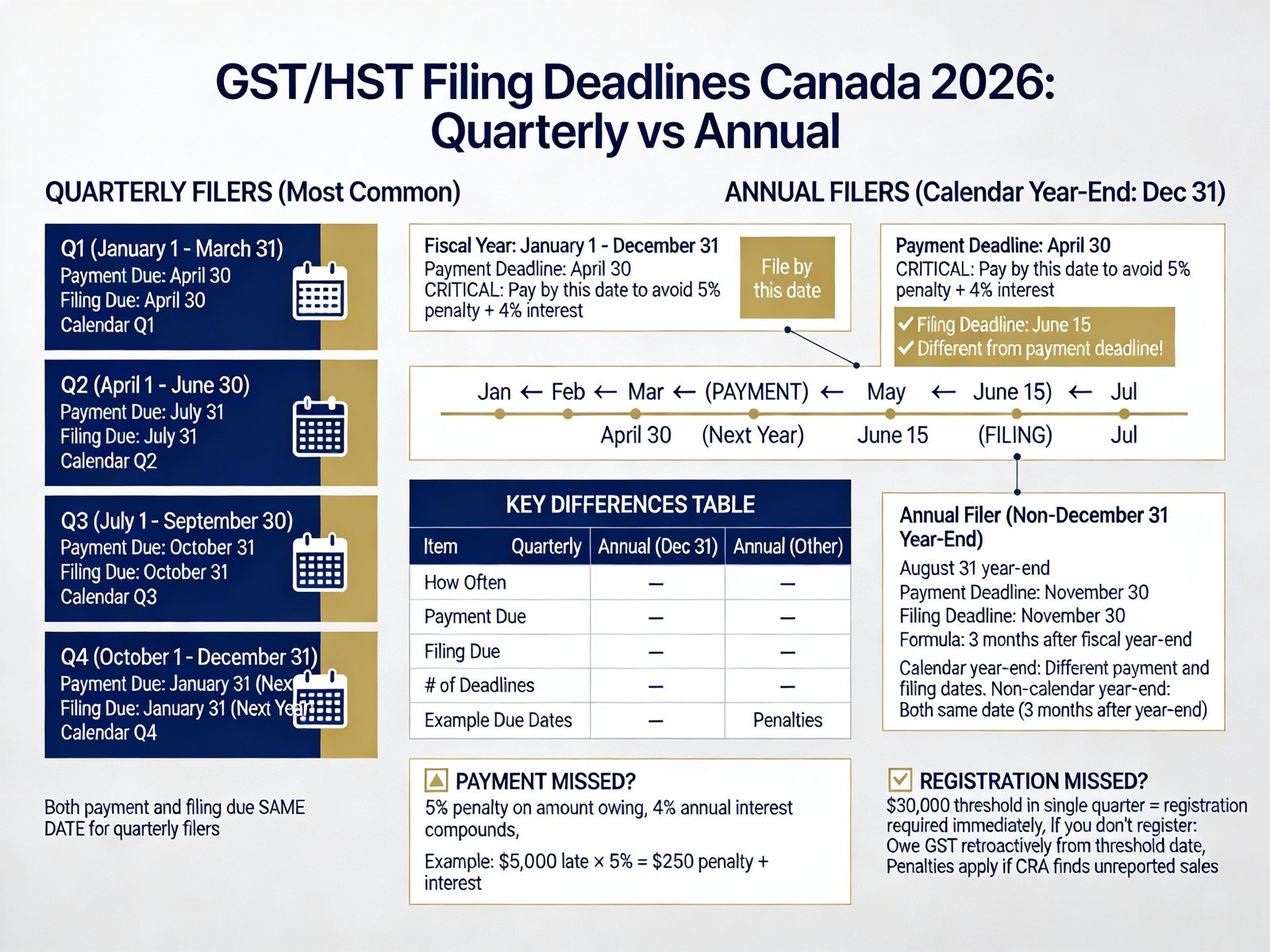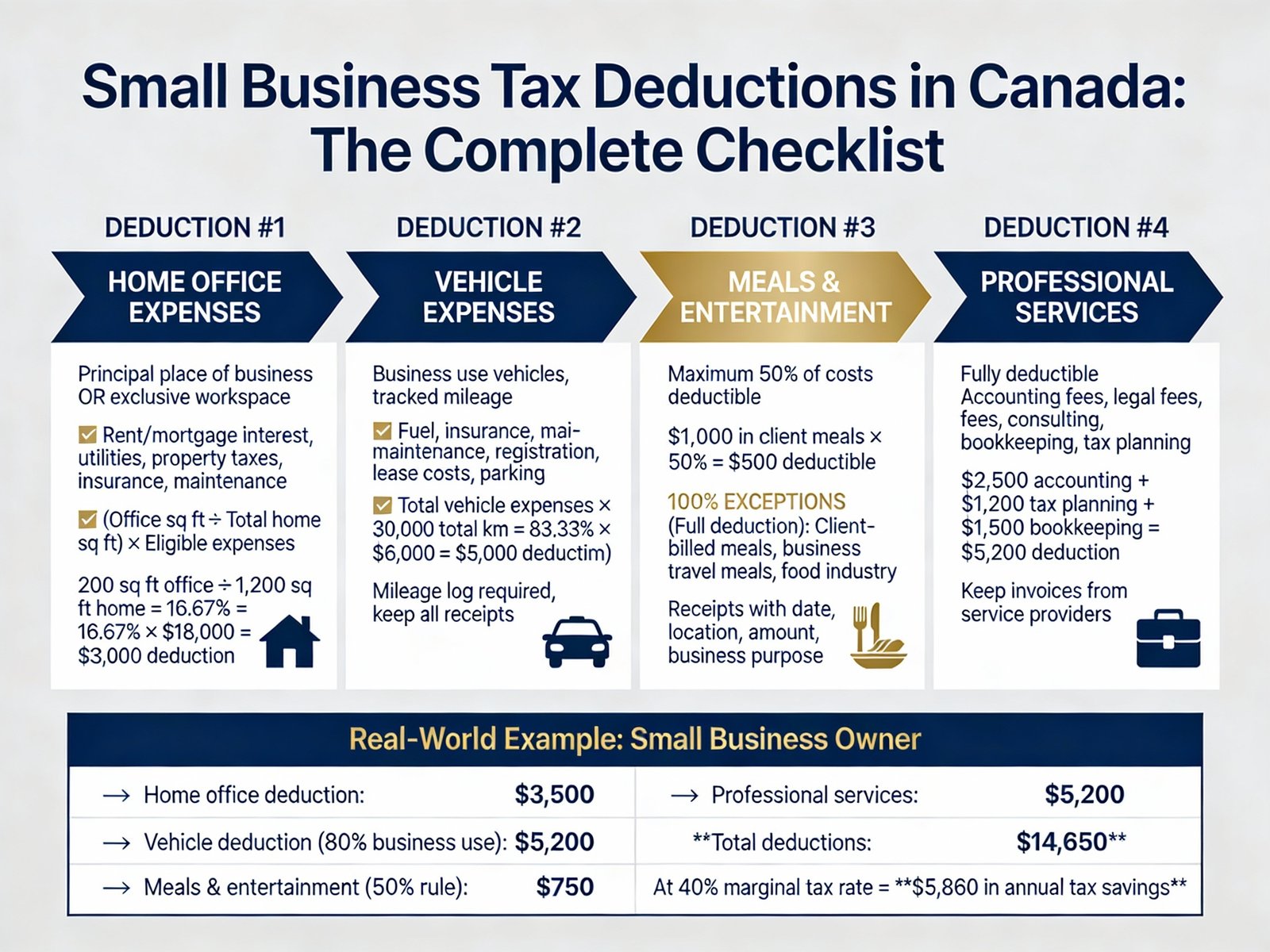The rise of the gig economy and flexible work arrangements has led many Albertans to pursue careers as freelancers or independent contractors. While self-employment offers numerous advantages—such as greater autonomy, control over your schedule, and the potential for financial reward—it also comes with unique tax obligations. Managing taxes as a freelancer or contractor in Alberta requires a solid understanding of income reporting, deductions, and how to handle Goods and Services Tax (GST) registration.
Failing to meet these tax obligations can lead to penalties, audits, and financial stress. This guide will walk you through the essential tax considerations for freelancers and contractors in Alberta, providing clarity on income reporting, GST registration thresholds, deductions, and much more.

Tax Obligations for Self-Employed Individuals
As a freelancer or independent contractor, your tax obligations differ from those of salaried employees. Here’s what you need to know:
Income Reporting
Freelancers and contractors must report their income on their personal income tax return, but unlike employees, they are responsible for reporting both income and business expenses.
Business Income Declaration
You must declare all income earned from freelance or contracting activities using the T2125 – Statement of Business or Professional Activities form. This form helps you detail both the income earned and any expenses incurred to operate your business.
Example: An Edmonton-based freelance graphic designer earns CAD 65,000 from various clients over the year. They report this as business income on their personal tax return, using the T2125 form to deduct eligible business expenses.
Worldwide Income
As a resident of Canada, you must report income from all sources, both domestic and international. Even if you earn money from foreign clients, the income must be reported on your Canadian tax return.
Business Expenses and Deductions
As a freelancer or contractor, you can deduct eligible business expenses from your income, which can significantly lower the amount of tax you owe. Here are some common deductions available to self-employed individuals:
Home Office Expenses
If you use your home as your principal place of business, you can deduct a portion of your home-related expenses, such as:
- Rent
- Mortgage interest
- Property taxes
- Utilities
- Home insurance
Example: A software developer working from home can claim 20% of their home expenses based on the square footage used for business.
Vehicle Expenses
You can deduct a portion of vehicle expenses related to business use. This includes fuel, maintenance, insurance, and depreciation. It’s crucial to keep accurate records of business-related travel and calculate the percentage of business use.
Supplies and Equipment
Purchases of office supplies, computers, software, and tools necessary for your business can be deducted. Large equipment expenses may need to be depreciated over time.
Professional Fees
You can deduct professional fees, such as payments for accounting, legal services, or industry membership dues.
Travel and Meals
Business travel expenses, such as airfare, accommodation, and transportation, are deductible. Meals during business travel are typically deductible at 50%.
Record Keeping: To substantiate your expense claims, maintain detailed records and receipts. The CRA may request evidence of expenses in the event of an audit.
Installment Payments
As a freelancer or contractor, your taxes are not automatically deducted from your income, unlike salaried employees. If you expect to owe more than CAD 3,000 in taxes for the current year and either of the two previous years, you are required to make quarterly installment payments.
Installment Deadlines
Installments are typically due on:
- March 15
- June 15
- September 15
- December 15
Example: A self-employed photographer expects to owe CAD 4,500 in taxes based on their business income. To avoid a lump-sum tax payment at the end of the year, they make four quarterly payments of CAD 1,125.
Canada Pension Plan (CPP) Contributions
Self-employed individuals are responsible for both the employee and employer portions of CPP contributions. In 2023, the CPP contribution rate for self-employed individuals is 10.9% of net business income, up to the annual maximum pensionable earnings limit.
Calculation: CPP contributions are calculated on net business income after expenses. The maximum contribution for 2023 is CAD 7,508.90.
Example: A contractor earning CAD 60,000 after expenses would be required to contribute 10.9% of that income toward CPP, which amounts to CAD 6,540.
Employment Insurance (EI) Special Benefits
As a self-employed individual, you are not automatically enrolled in Employment Insurance (EI). However, you can choose to opt into the EI program to access special benefits like:
- Maternity benefits
- Parental benefits
- Sickness benefits
- Compassionate care benefits
Optional Enrollment
You must register for EI through Service Canada at least one year before claiming benefits.
Filing Deadlines
- Tax Return Due Date: While most Canadians must file their personal tax return by April 30, self-employed individuals and their spouses or common-law partners have until June 15 to file. However, any taxes owing must be paid by April 30 to avoid interest charges.
- Late Filing Penalties: Failure to file on time may result in penalties and interest on any taxes owed. The penalty is typically 5% of the amount owing, plus 1% for each month your return is late.
GST Registration Thresholds
As a freelancer or contractor, you may need to collect and remit Goods and Services Tax (GST). Understanding when to register for GST and how to handle it is crucial for compliance.
What is GST?
The Goods and Services Tax (GST) is a federal value-added tax of 5% applied to most goods and services in Canada. As a self-employed individual, you may be required to register for GST and collect it from your clients.
Small Supplier Threshold
$30,000 Threshold
You are considered a small supplier if your total taxable revenues before expenses are CAD 30,000 or less over four consecutive calendar quarters. Small suppliers are not required to register for GST.
Voluntary Registration
Even if your revenues are below the CAD 30,000 threshold, you may choose to voluntarily register for GST. By doing so, you can claim Input Tax Credits (ITCs) on GST paid for eligible business expenses, such as equipment, supplies, and services.
Example: A web designer earning CAD 25,000 annually chooses to register for GST to claim ITCs on software purchases and business equipment.
Mandatory Registration
Exceeding the Threshold
Once you exceed CAD 30,000 in taxable revenues over four consecutive quarters or in a single quarter, you must register for a GST/HST account within 29 days of the sale that pushed you over the threshold.
Effective Date
Once you are required to register, you must begin charging GST on sales that exceed the threshold. Failure to register in time can result in penalties.
Example: A freelance writer earns CAD 31,000 in the first two quarters of the year. They are required to register for GST and start charging clients GST on their services.
Collecting and Remitting GST
Charging GST
Once registered, you must add 5% GST to the cost of your taxable goods and services. For instance, if you charge CAD 1,000 for a service, you will need to add CAD 50 (5%) for GST.
Filing GST Returns
You must file GST returns either annually, quarterly, or monthly, depending on your total revenues. Most freelancers opt to file annually to simplify the process, but larger businesses may benefit from more frequent filings.
Remittance
When filing your GST return, you will remit the net GST collected to the CRA. The net amount is calculated as the GST collected from clients minus any Input Tax Credits (GST paid on business expenses).
Input Tax Credits (ITCs)
As a GST-registered business, you can claim ITCs to recover GST paid on eligible business expenses. These credits reduce the amount of GST you need to remit to the CRA.
Documentation
Ensure you keep detailed receipts and invoices that show the GST paid on purchases. These records are essential for claiming ITCs and must be provided if the CRA audits your GST returns.
Simplified Methods
Quick Method of Accounting for GST
The Quick Method is a simplified way of calculating GST remittances. It’s particularly beneficial for businesses that have minimal input tax credits to claim.
Eligibility
The Quick Method is available to businesses with annual taxable supplies (including GST) of CAD 400,000 or less.
Additional Considerations
Freelancers and contractors in Alberta should also be aware of other tax and business-related considerations:
Provincial Taxes
Alberta has a relatively simple tax structure:
- Alberta Tax Rates: Alberta has a flat provincial income tax rate of 10% on taxable income over CAD 131,220. For incomes below this threshold, lower tax rates apply.
- No Provincial Sales Tax (PST): Alberta does not have a provincial sales tax. Only the federal GST applies to goods and services.
Business Structure
Sole Proprietorship vs. Incorporation
Operating as a sole proprietor is simpler but may expose you to personal liability. Incorporating your business can provide limited liability protection and may offer potential tax advantages, depending on your income level and business goals.
Professional Advice: Consult an accountant or lawyer to determine the best business structure for your situation.
Workers’ Compensation Board (WCB) Coverage
Optional Coverage
Freelancers and contractors can opt into WCB-Alberta for protection in case of work-related injuries. Some clients may require proof of WCB coverage before agreeing to contracts.
Contracts and Agreements
Always use written contracts when working with clients. Contracts should clearly outline the scope of work, payment terms, and other conditions. This helps protect your interests and ensures you are treated as an independent contractor rather than an employee, which could have tax implications.
How BOMCAS Canada Accounting Firm Can Help
Navigating the tax obligations of self-employment can be complex, but BOMCAS Canada Accounting Firm specializes in providing personalized tax services to freelancers and contractors in Alberta. We offer comprehensive support, ensuring that your taxes are filed accurately and that you take advantage of all available deductions and credits.
Our Services Include:
- Tax Planning and Preparation: We help freelancers and contractors maximize deductions, claim eligible tax credits, and ensure compliance with CRA regulations.
- GST Registration and Filing: We assist with GST registration, choosing the right filing frequency, and preparing accurate GST returns.
- Business Advisory Services: Our team offers guidance on business structure, financial planning, and growth strategies tailored to freelancers and contractors.
- Record-Keeping Solutions: We provide tools and advice for effective record-keeping, making tax time easier and protecting you during CRA audits.
- Personalized Support: Our dedicated team understands the unique challenges of self-employment and offers customized solutions for your specific needs.
Contact Us Today
Secure your financial future and focus on growing your freelance or contracting business with confidence. At BOMCAS Canada, we are committed to supporting freelancers and contractors in Edmonton and across Alberta with expert tax and accounting services.
Phone: 780-667-5250
Fax: 780-851-2520
Email: info@bomcas.ca
Website: https://bomcas.ca










 View Our Location
View Our Location





 181 Meadowview Bay, Sherwood Park, AB T8H 1P7, Canada (Online Clients Only)
181 Meadowview Bay, Sherwood Park, AB T8H 1P7, Canada (Online Clients Only)